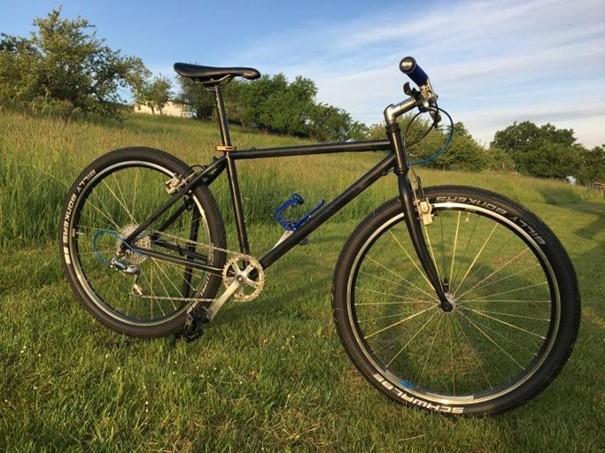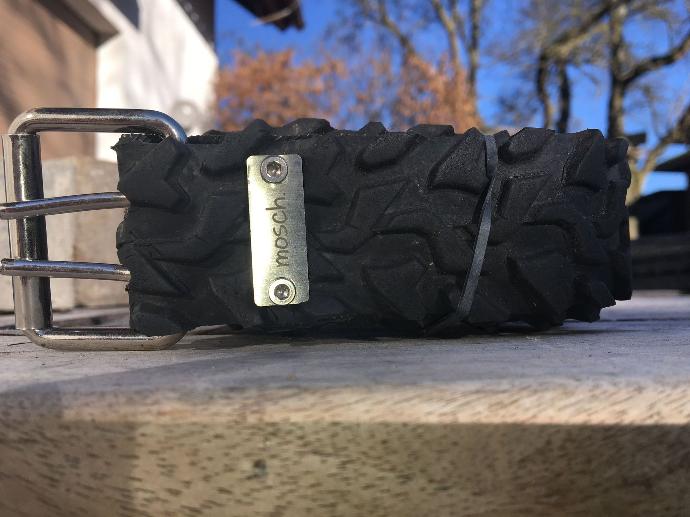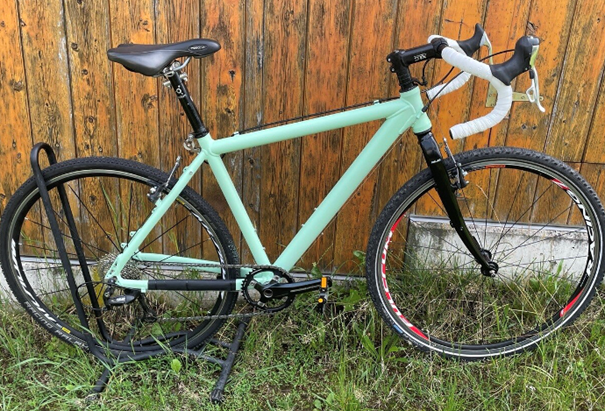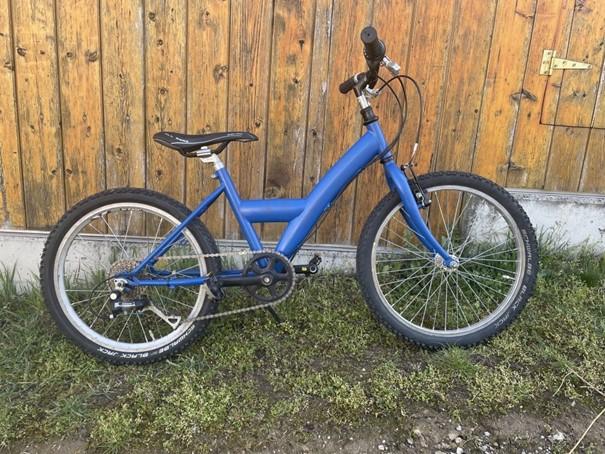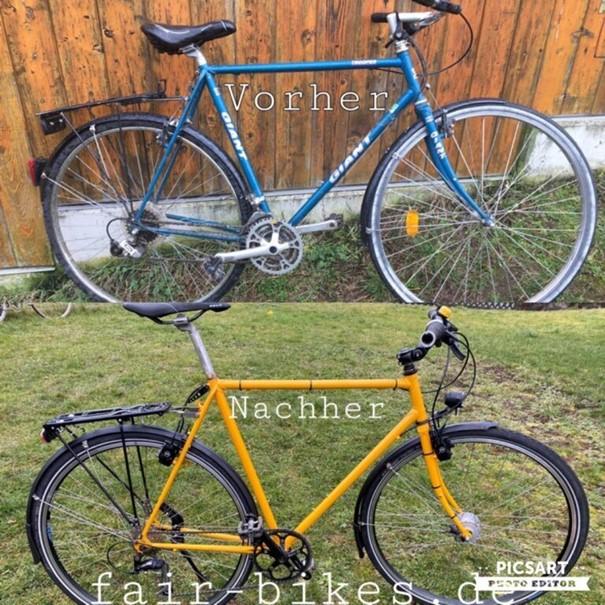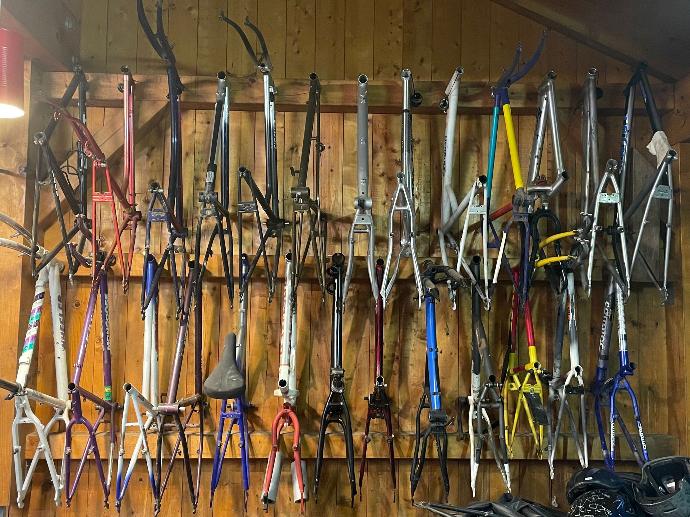How everything started
The easy way has never been our way. We naively thought that we could invent some more environmentally friendly bicycle products. In 2019 we were smiled at for this.
Then we realized that it should actually be a new business model.
It is now clear that the global crises of health, environment & climate, social gaps and democracy vs. autocracy must now all be answered with significantly increased urgency.
And now we realize that after one or two setbacks (two steps forward, one back) we can shape the future with our products.
If we had known that beforehand, we probably would not have been able to do anything in shock. How good that we were so naive and just started.
Start designing too, otherwise others who want to go in a different direction will do it. Start today, just like that, and do it. Then we will be able to answer all urgent questions at the same time. Because all crises are interrelated and can therefore be solved with a holistic approach.
The future is now.

In November 2019, we invited people to our new semi-open workshop on the subject of "sustainable bicycles" in freezing temperatures.
We offered bikes we built from scrap, as well as Italian wood rims, belts made from old tires, and bike wraps. From this point on, we dealt with many open questions in depth: What does sustainability actually mean? Are high-quality bicycle parts from the Far East worse than simple parts from Europe? How can sustainability become affordable? Which materials are useful? Is plastic always bad and wood always good?
At first we poked around in the fog and worked according to the "trial and error" principle. We tried, discarded, developed successful approaches and buried others again. We worked our findings into our offers and tested on the market what was accepted and what wasn't. We offered collaborations with manufacturers, but most didn't take us seriously. We took part in the Eurobike Awards in 2021 with an UpCycling bike and made it straight into the final.
Here is a small impression of the built bikes:
Dear manufacturers, our findings are sobering. We have to determine:
- Many aluminum frames are designed to break.
- Pedals do not hold up.
- Head sets do not last.
- Modern bottom brackets are worse than they were 25 years ago.
- Getting rid of the BSA thread is a throwback to the 70's.
- Shifters will not hold and cannot be repaired.
- Rear derailleurs made of composite material do not last.
- Drive parts could be much more durable.
- Mid-range gear hubs do not last and are even systematically destroyed in combination with mid-engines.
- Hub bearings could last a lot longer if they just kept their lubrication.
- Carbon is based on petroleum and later becomes hazardous waste.
- Brakes with DOT brake fluid become unusable within a few years and contain toxic substances.
- Brakes with mineral oil are sometimes extremely durable, but still contain toxic substances.
- There are plenty of cheap V-brakes with breakaway cable retainers, for over 20 years, and often on children's bikes.
- Most saddles are built in such a way that they cannot be refurbished.
- Lithium-ion batteries are based on a 40-year-old technology, for which large areas are destroyed in opencast mining for raw material extraction and sometimes dubious working conditions are accepted. The race for rare raw materials is exacerbating social tensions.
- Massive amounts of freewheels are installed up to the middle class, so that rows of axles break completely unnecessarily. The unbreakable cassette hub was invented in the 1980s.
- Even premium brands install rows and rows of cheap drive parts that wear out quickly.
- Innovations are seldom based on a real benefit, but force the throwaway idea for further increases in sales.
- The lack of technical standardization and systematic incompatibility of different systems makes it difficult or even impossible to reuse components.
- The ability of bicycles to be repaired has been drastically reduced over the past two decades due to internal trains, lines, cables, batteries and other components. In addition, there are compressions instead of screw connections and an insufficient supply of spare parts with small parts.
- Produktionsstandorte werden unter Gesichtspunkten von Zollfreiheit und Arbeitsmindestlohn ausgesucht. Arbeitsbedingungen und Umweltschutz sind nachrangig.
- Fahrradteile werden mit schwerölbetriebenen Schiffen von Asien zu uns transportiert.
- Anfragen abseits des "Business as usual" werden typischerweise ignoriert oder mit der Antwort "nicht möglich" versehen. Z.B. Connex-Ketten made in Germany auf der Rolle. Oder OEM-Belieferung Magura ohne Mineralöl in der Bremse. Oder SRAM Ketten made in Portugal auf der Rolle (wir sollen eine Order von mindestens 150.000 $ platzieren). Oder einzeln tauschbare Miche Ritzel made in Italy in Wunschabstufung.
- Die Fahrradbranche bezeichnet sich selbst als Treiber der nachhaltigen Mobilitätswende und bietet gleichzeitig keine Transparenz zu dieser Behauptung. Das ist Greenwashing, welches zukünftig von der EU verboten wird.
- Der Vororderdruck sorgt bei den Händlern dafür, dass Endverbraucher systematisch genötigt werden, ihr altes Gebrauchtrad wegzuwerfen (Reparatur wäre günstig und ökologisch sinnvoll) und sich ein E-Bike zu kaufen (teuer und mit hoher Carbonisierung).
- Es gibt wenig Wissen über Nachhaltigkeit. Dass es neben Recycling auch noch mehrere Kreislaufstufen mit erheblich geringerem Ressourcenverbrauch gibt, ist kaum bekannt. Das Bewusstsein dazu wird auch nicht geschärft. Es wird in zu einfachen Kategorien gedacht und die Komplexität ausgeblendet. Nach dem Motto: Recyclingfähiger Alurahmen aus Europa plus Bremse made in Germany = nachhaltig.
- Das Thema Nachhaltigkeit ist allzu oft bei den Marketingabteilungen angesiedelt. Vorsicht Greenwashing.
- Die Nutzung des Fahrrades ist zwar an sich nachhaltig. Es wird aber der Image-Transfer zum E-Bike geschaffen (Akkus kritisch), als auch die Umweltrelevanz der Fahrradproduktion im Vergleich zur Autoproduktion als geringfügig heruntergespielt. Wir haben noch nicht mal Zahlen zu Recyclinganteilen bei Fahrradproduzenten gefunden, während diese z.B. bei BMW ganz klar existieren (30% und auf dem Weg zu 50%).
This was certainly not the complete list. The bicycle is considered a green means of transport. Really now? Obviously not really.
What is the better way now? Let's change perspective for a moment.
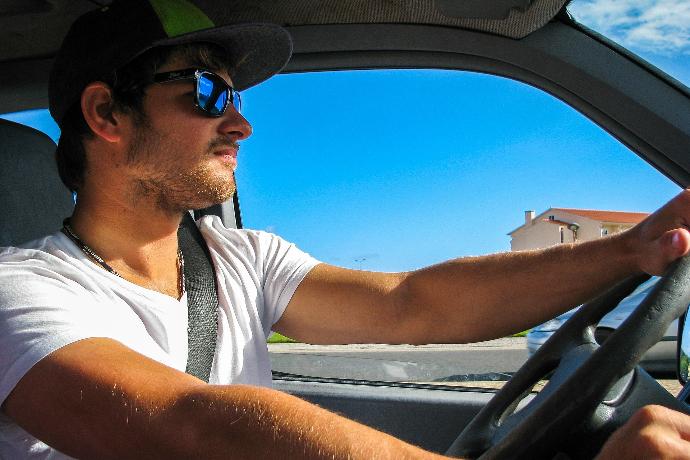
Change of perspective
We are used to seeing things from a certain perspective.
Our brain would be overwhelmed if we constantly questioned everything and could never be sure what is actually right.
However, we are currently experiencing upheavals where a change of perspective is worthwhile.
